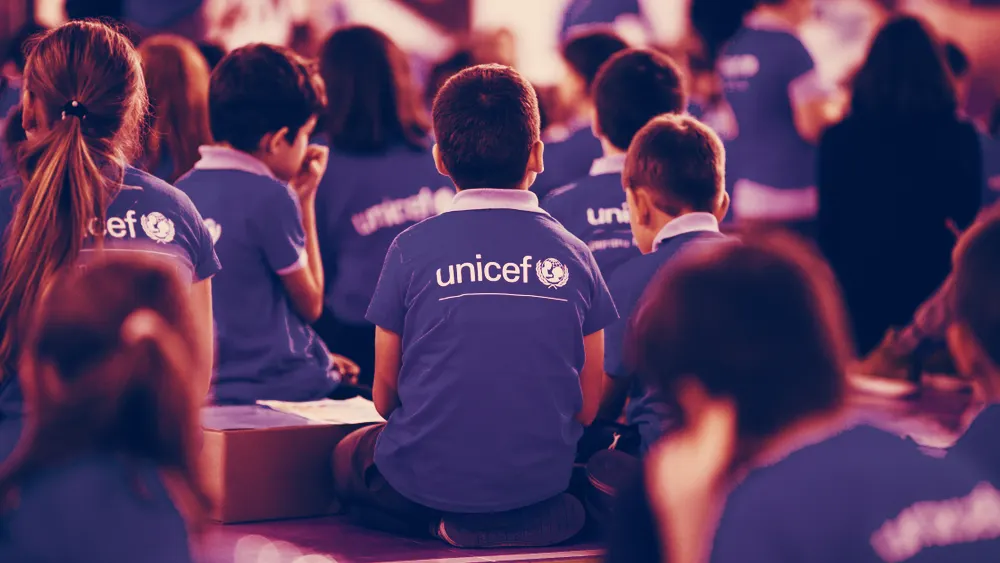In brief
- Crypto exchange Huobi will donate $1 million in Bitcoin and fiat money to the UN’s children’s charity, UNICEF.
- Huobi has already donated 7 BTC to UNICEF’s CryptoFund, with the remainder still to come.
UNICEF, or the United Nations International Children’s Emergency Fund, announced today that it has accepted what it is calling its “first institutional Bitcoin donation” from Huobi Charity Limited, a sister organization to crypto exchange Huobi Global. The firm will donate a total of $1 million between Bitcoin and fiat money.
Huobi Charity Limited has already donated 7 Bitcoin, worth approximately $350,000 at the time of donation but about $412,000 as of this writing, to UNICEF’s CryptoFund. The firm will donate an additional $640,000 in fiat currency over the next three years to UNICEF’s Innovation Fund, director Thomas Davin told Decrypt.
The UNICEF CryptoFund was established in 2019 specifically for the purpose of accepting, holding, and distributing cryptocurrency to fund projects that can benefit children around the world. The CryptoFund—which accepts both Bitcoin and Ethereum—is designed to be transparent about the origins and use of its funds, with a website that allows the public to track its comings and goings.
“The CryptoFund is not about any particular cryptocurrency; it’s about UNICEF building institutional knowledge around a new asset class,” Davin explained to Decrypt. “Whether it be cryptocurrency, or some other type of digital asset, UNICEF is exploring the opportunities and challenges that this new technology presents in the context of our work.”
According to the CryptoFund website, UNICEF has previously accepted 2,267 ETH ($4.77 million) and 1 BTC (about $59,000) since launching, with donations from The Ethereum Foundation and crypto game publisher Animoca Brands. Meanwhile, the UNICEF Innovation Fund uses both cryptocurrency and fiat currency to invest in projects based around open-source technologies that can benefit children, such as blockchain tech and virtual and augmented reality.
According to Davin, blockchain and cryptocurrency could collectively have a significant impact in driving solutions and technology to help UNICEF provide assistance to children around the world. He said that blockchain technology in particular can be useful for better distributing resources, for improving transparency and efficiency around such distribution, and to encourage the development and maintenance of open-source digital resources. He sees the potential for both incremental and disruptive changes therein.
“We have seen no other technology cluster with a steeper growth over the past years—or more potential to solve any conceivable problem—than that of Bitcoin, Ethereum, and other blockchain technology applications,” he said.
In June 2020, UNICEF’s CryptoFund announced the investment of 1,000 ETH split equally between eight startups (125 ETH each). The recipients included startups based in Guatemala, India, Turkey, and Cambodia that utilize technologies such as VR-driven exposure therapy, blockchain-based government credentials, and AI-driven educational activities. The eight startups had already been a part of UNICEF’s Innovation Fund and had previously received up to $100,000 each from that initiative.
Davin said that UNICEF will announce its next set of blockchain investments in the near future. “The companies joining our portfolio are developing solutions that we think can be directly useful to UNICEF in the field,” he said, “improving efficiency of how we transfer value and how we can make financial systems more inclusive.”
Game publisher Ubisoft has also raised money for UNICEF via its own blockchain-based game called Rabbids Token. Launched last year, the web game allows users to purchase colorful versions of its silly Rabbids alien characters from past video games—but the “owner” must pay a recurring tax to keep the crypto collectible non-fungible token (NFT). Rabbids Token has raised more than 38 ETH (approximately $80,000) for UNICEF to date.
Editor's note: This article was updated after publication to add comments from UNICEF Innovation Fund Director Thomas Davin and to clarify the source of the donation.

